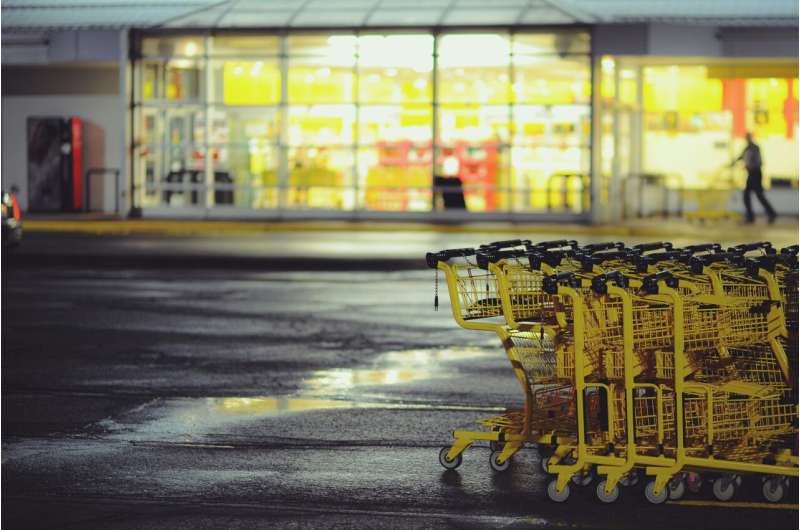This article has been reviewed according to Science X's editorial process and policies. Editors have highlighted the following attributes while ensuring the content's credibility:
fact-checked
peer-reviewed publication
trusted source
proofread
Ordinance replaced junk food in store checkouts: Study finds 83% of products in stores were in compliance 1 year later

Parents shopping with their children in Berkeley, California, can now breathe a sigh of relief when they get to the checkout lane. Likewise, Berkeley shoppers looking for an impulse snack purchase now have healthy options at the checkout. That is because in March 2021, Berkeley became the world's first city to implement a healthy checkout policy, which sets nutritional standards for store checkouts.
Berkeley, located in the San Francisco Bay Area, has been followed by Perris, a small city in Southern California, as well the United Kingdom.
According to Berkeley's policy, only the following products can be placed at checkout: unsweetened beverages, healthy foods (e.g., fruits, nuts, whole grains) with up to 5 grams of added sugar and up to 200 milligrams of sodium, and items such as lip balm, magazines and batteries.
Most products stocked in store checkouts—or 83%—were compliant just one year after the policy took effect, according to research from the University of California, Davis. That is a 63% improvement compared to before the policy.
When the researchers looked only at food and beverage options at checkout, the improvement was even more pronounced. The percentage of healthy foods and beverages at checkout more than doubled, from 29% to 62%.
The checkout is a particularly important part of any store because it is the only place that all customers must pass through to exit the store, leading to impulse buys, researchers said. These new standards apply to all foods and beverages in all checkout areas of the city's large food stores.
"We see quite a dramatic improvement in the healthfulness of foods and beverages in Berkeley store checkouts," said Jennifer Falbe, the lead author of a study on the Berkeley policy published in JAMA Network Open.
"Before the policy, the majority—about 70%, of food-and-beverage products at checkout—were unhealthy, and now that's been cut in half," added Falbe, associate professor of Nutrition and Human Development in the UC Davis Department of Human Ecology. "Stores replaced sugary drinks, candy and other sweets with unsweetened drinks, healthy foods like nuts, seeds, and fruits and nonfood items."
Falbe studies the effects of food policies on human health and behavior. Falbe noted that chain stores typically stock candy and soda at checkout because of marketing contracts in which large ultraprocessed food and beverage companies pay stores for premium placement.
"Many of us think of the grocery store as a neutral environment and don't realize all the ways our decisions may be influenced, including by where products are placed."
Falbe noted that many of these food and beverage companies also produce healthier product lines, like sparkling water and nut bars, which may help with the transition.
Researchers observed checkout areas in Berkeley and three comparison cities without the ordinance both a month before the policy was implemented and again a year later. In total, they recorded data on more than 76,000 products across 23 stores in Berkeley and 75 stores in comparison cities. More than 50,000 of those products were foods or beverages.
While they found large improvements in the healthfulness of Berkeley checkouts, the points of sale in the comparison cities stayed about the same over time.
The ordinance applies to all stores with more than 2,500 square feet of floor space selling at least 25 linear feet of food, such as supermarkets, mass merchandisers, drugstores, and large grocery, dollar and convenience stores. (Most convenience stores are too small to be subject to the law.)
Similar policies have since been implemented throughout the United Kingdom and Perris, a city in Southern California, since the Berkeley ordinance went into effect.
"These improvements in the healthfulness of Berkeley store checkouts happened just one year after the policy took effect and just one month after the policy became enforceable. With more time and technical assistance from the city, store checkouts may improve even further," said Falbe.
More information: Food Environment After Implementation of a Healthy Checkout Policy, JAMA Network Open (2024). DOI: 10.1001/jamanetworkopen.2024.21731




















